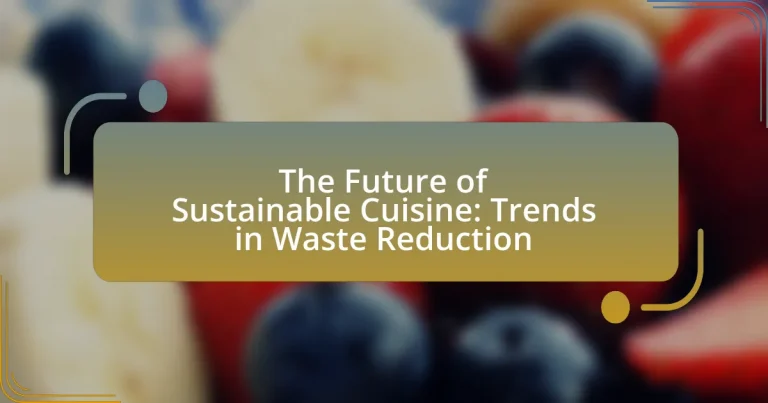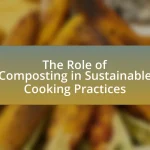The article focuses on the future of sustainable cuisine, emphasizing trends in waste reduction and the shift towards plant-based diets, innovative food technologies, and practices aimed at minimizing food waste. It defines sustainable cuisine as a food system that prioritizes environmental health, social equity, and economic viability, highlighting key principles such as sourcing local ingredients and reducing waste. The article also explores the differences between sustainable and traditional cuisine, the importance of waste reduction, and emerging trends like upcycling and zero-waste cooking. Additionally, it addresses the challenges faced by the food industry in adopting sustainable practices and the role of consumer awareness and technology in promoting sustainability.
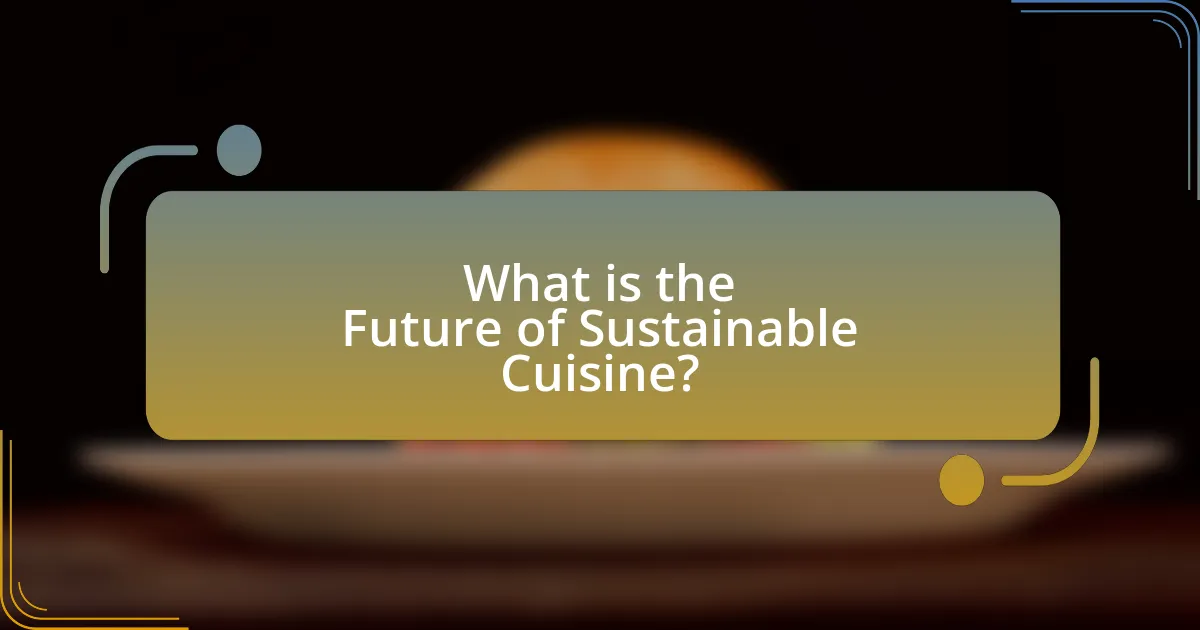
What is the Future of Sustainable Cuisine?
The future of sustainable cuisine is characterized by a significant shift towards plant-based diets, innovative food technologies, and waste reduction practices. Research indicates that plant-based diets can reduce greenhouse gas emissions by up to 70% compared to meat-heavy diets, highlighting their environmental benefits. Additionally, advancements in food technology, such as lab-grown meats and vertical farming, are expected to enhance food production efficiency while minimizing resource use. Furthermore, trends in waste reduction, including composting and upcycling food scraps, are gaining traction, with studies showing that approximately one-third of food produced globally is wasted. This focus on sustainability not only addresses environmental concerns but also meets the growing consumer demand for ethical and eco-friendly food options.
How is sustainable cuisine defined in today’s context?
Sustainable cuisine is defined in today’s context as a food system that prioritizes environmental health, social equity, and economic viability. This definition encompasses practices such as sourcing local and seasonal ingredients, minimizing food waste, and utilizing sustainable farming methods. For instance, the Food and Agriculture Organization (FAO) emphasizes that sustainable food systems should enhance food security while reducing the ecological footprint of food production. Additionally, a report by the United Nations highlights that sustainable cuisine can significantly contribute to climate change mitigation by promoting plant-based diets and reducing reliance on resource-intensive animal agriculture.
What are the key principles of sustainable cuisine?
The key principles of sustainable cuisine include sourcing local and seasonal ingredients, minimizing food waste, and prioritizing organic and ethically produced foods. Sourcing local ingredients reduces transportation emissions and supports local economies, while seasonal eating ensures that food is harvested at its peak, enhancing flavor and nutritional value. Minimizing food waste involves practices such as using whole ingredients and repurposing leftovers, which can significantly reduce the environmental impact of food production. Prioritizing organic and ethically produced foods promotes biodiversity and animal welfare, contributing to a more sustainable food system. These principles collectively aim to create a more environmentally friendly and socially responsible culinary landscape.
How does sustainable cuisine differ from traditional cuisine?
Sustainable cuisine differs from traditional cuisine primarily in its focus on environmental impact and resource conservation. While traditional cuisine often emphasizes local ingredients and cultural practices, sustainable cuisine prioritizes methods that reduce waste, minimize carbon footprints, and promote biodiversity. For instance, sustainable cuisine frequently incorporates seasonal produce and plant-based options, which can lead to a significant reduction in greenhouse gas emissions compared to meat-heavy traditional diets. Research indicates that adopting plant-based diets can lower food-related emissions by up to 70%, highlighting the effectiveness of sustainable practices in addressing climate change.
Why is waste reduction important in sustainable cuisine?
Waste reduction is crucial in sustainable cuisine because it minimizes environmental impact and conserves resources. By reducing food waste, restaurants and consumers can lower greenhouse gas emissions, as decomposing food in landfills produces methane, a potent greenhouse gas. According to the Food and Agriculture Organization, approximately one-third of all food produced globally is wasted, contributing to significant resource depletion and environmental degradation. Implementing waste reduction strategies, such as composting and utilizing surplus ingredients, not only enhances sustainability but also promotes economic efficiency by lowering costs associated with waste disposal and purchasing.
What impact does food waste have on the environment?
Food waste significantly harms the environment by contributing to greenhouse gas emissions, depleting natural resources, and increasing landfill waste. When food is discarded, it often ends up in landfills where it decomposes anaerobically, releasing methane, a potent greenhouse gas that is 25 times more effective at trapping heat in the atmosphere than carbon dioxide over a 100-year period. According to the Food and Agriculture Organization (FAO), approximately one-third of all food produced globally is wasted, which translates to about 1.3 billion tons annually. This waste not only exacerbates climate change but also represents a waste of the water, land, and energy resources used in food production, further straining the environment.
How does reducing waste contribute to sustainability?
Reducing waste contributes to sustainability by minimizing resource consumption and lowering environmental impact. When waste is reduced, fewer raw materials are extracted, which decreases habitat destruction and pollution associated with resource extraction. For instance, the Food and Agriculture Organization (FAO) estimates that approximately one-third of all food produced globally is wasted, which translates to a significant loss of resources such as water, energy, and labor. By implementing waste reduction strategies, such as composting and efficient food sourcing, the food industry can significantly lower greenhouse gas emissions and conserve natural resources, thereby promoting a more sustainable future.
What trends are emerging in sustainable cuisine focused on waste reduction?
Emerging trends in sustainable cuisine focused on waste reduction include the increased use of upcycled ingredients, which repurpose food byproducts into new dishes, and the adoption of zero-waste cooking techniques that utilize every part of an ingredient. For instance, chefs are creatively using vegetable scraps to make stocks or sauces, significantly minimizing food waste. Additionally, there is a growing emphasis on local sourcing, which reduces transportation waste and supports community agriculture. Research indicates that upcycling can reduce food waste by up to 30%, highlighting its effectiveness in sustainable practices.
What innovative practices are chefs adopting to minimize waste?
Chefs are adopting innovative practices such as utilizing whole ingredients, implementing fermentation techniques, and creating zero-waste menus to minimize waste. By using every part of an ingredient, chefs reduce food waste significantly; for example, vegetable scraps can be transformed into stocks or garnishes. Fermentation not only preserves food but also enhances flavors, allowing chefs to repurpose surplus ingredients. Additionally, zero-waste menus focus on creating dishes that incorporate all components of an ingredient, which has been shown to decrease waste by up to 30% in some restaurants. These practices reflect a growing commitment to sustainability within the culinary industry.
How are consumers influencing trends in sustainable cuisine?
Consumers are significantly influencing trends in sustainable cuisine by prioritizing eco-friendly practices and demanding transparency from food producers. This shift is evident as surveys indicate that over 70% of consumers are willing to pay more for sustainably sourced products, reflecting a growing preference for organic, local, and plant-based foods. Additionally, the rise of social media platforms has amplified consumer voices, allowing them to share their preferences and advocate for sustainable practices, which in turn pressures restaurants and food brands to adopt waste reduction strategies and sustainable sourcing methods.
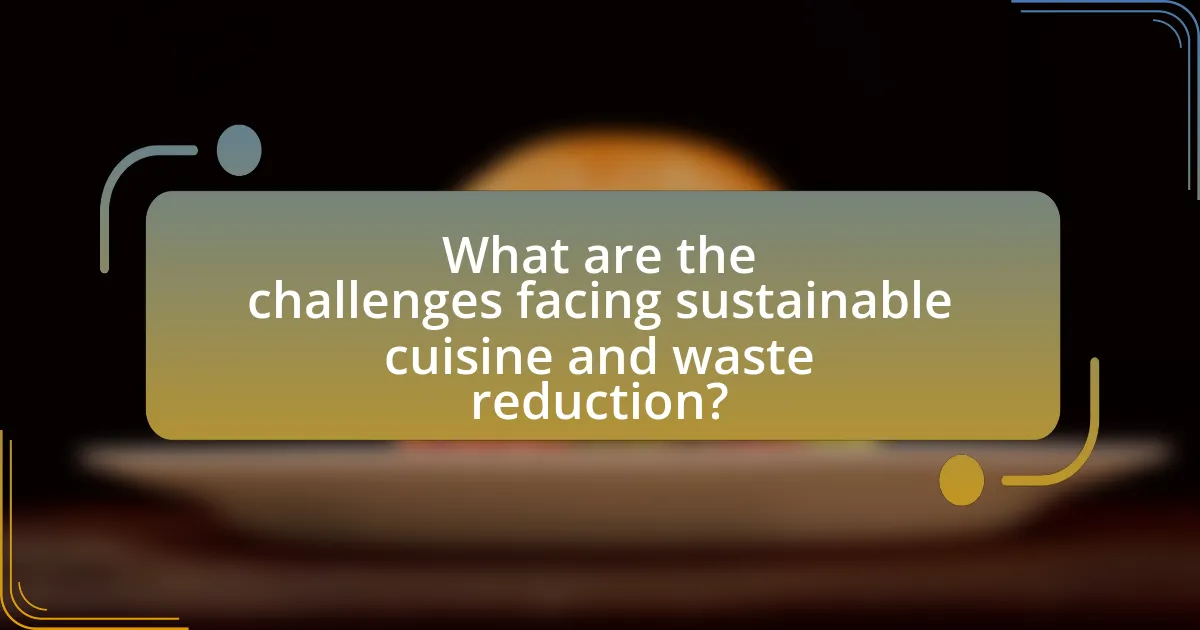
What are the challenges facing sustainable cuisine and waste reduction?
The challenges facing sustainable cuisine and waste reduction include high costs, limited consumer awareness, and logistical difficulties in sourcing local ingredients. High costs often deter restaurants and consumers from adopting sustainable practices, as organic and locally sourced products can be more expensive than conventional options. Limited consumer awareness results in a lack of demand for sustainable choices, making it difficult for businesses to justify the transition. Logistical difficulties arise from the complexities of supply chains, which can hinder the consistent availability of fresh, local ingredients necessary for sustainable cuisine. These challenges collectively impede the broader adoption of sustainable practices in the food industry.
What barriers do restaurants encounter in implementing waste reduction strategies?
Restaurants encounter several barriers in implementing waste reduction strategies, including financial constraints, lack of staff training, and insufficient infrastructure. Financially, many establishments struggle with the initial investment required for waste reduction technologies or systems, which can deter them from adopting such practices. Additionally, without proper training, staff may not understand how to effectively implement waste reduction measures, leading to inconsistent practices. Furthermore, inadequate infrastructure, such as limited access to composting facilities or recycling programs, can hinder the ability of restaurants to manage waste effectively. These barriers collectively impede the progress toward sustainable waste management in the restaurant industry.
How does cost affect the adoption of sustainable practices?
Cost significantly influences the adoption of sustainable practices, as higher initial investments can deter businesses and consumers from implementing eco-friendly solutions. For instance, sustainable materials and technologies often come with a premium price tag, which can lead to a perception that they are not economically viable. Research indicates that 70% of small businesses cite cost as a barrier to adopting sustainable practices, according to a study by the National Small Business Association. Additionally, the long-term savings associated with sustainable practices, such as reduced energy costs and waste management expenses, may not be immediately apparent, further complicating decision-making. Thus, while the upfront costs can hinder adoption, the potential for future savings and environmental benefits remains a critical consideration.
What role does consumer awareness play in these challenges?
Consumer awareness plays a crucial role in addressing the challenges of waste reduction in sustainable cuisine. Increased awareness among consumers leads to more informed choices regarding food sourcing, preparation, and disposal, which directly impacts waste generation. For instance, studies show that consumers who are educated about the environmental effects of food waste are more likely to adopt practices such as meal planning and composting, thereby reducing overall waste. Additionally, a survey by the Food Waste Reduction Alliance found that 84% of consumers believe they can make a difference in reducing food waste, highlighting the significant influence of consumer awareness on sustainable practices.
How can technology aid in waste reduction within sustainable cuisine?
Technology can aid in waste reduction within sustainable cuisine by utilizing data analytics and smart inventory management systems to optimize food purchasing and minimize spoilage. For instance, restaurants can implement software that tracks inventory levels in real-time, allowing them to adjust orders based on actual consumption patterns, which can reduce over-purchasing by up to 30%. Additionally, technologies such as food preservation methods, including vacuum sealing and controlled atmosphere storage, extend the shelf life of ingredients, further decreasing waste. Studies have shown that implementing these technologies can lead to a significant reduction in food waste, with some establishments reporting a decrease of over 50% in waste generated.
What tools are available for tracking food waste in kitchens?
Tools available for tracking food waste in kitchens include digital inventory management systems, waste tracking software, and smart scales. Digital inventory management systems, such as BlueCart and SimpleOrder, allow kitchens to monitor stock levels and expiration dates, reducing waste by ensuring ingredients are used before they spoil. Waste tracking software like LeanPath and Winnow enables kitchens to log and analyze food waste data, providing insights into waste patterns and helping to identify areas for improvement. Smart scales, such as those offered by Food Waste Reduction, measure the weight of food waste in real-time, allowing for precise tracking and reporting. These tools collectively help kitchens optimize their operations and minimize food waste, contributing to sustainable practices in the culinary industry.
How can apps and platforms promote sustainable eating habits?
Apps and platforms can promote sustainable eating habits by providing users with personalized meal planning, educational resources, and community engagement features. Personalized meal planning helps users select recipes based on seasonal, local ingredients, which reduces carbon footprints associated with food transportation. Educational resources can include information on the environmental impact of food choices, such as the carbon emissions linked to meat production versus plant-based diets, which can encourage users to make more sustainable decisions. Community engagement features, such as forums or social sharing options, can foster a sense of accountability and support among users, further reinforcing sustainable practices. For instance, studies show that social influence can significantly impact dietary choices, making community-driven platforms effective in promoting sustainable eating habits.
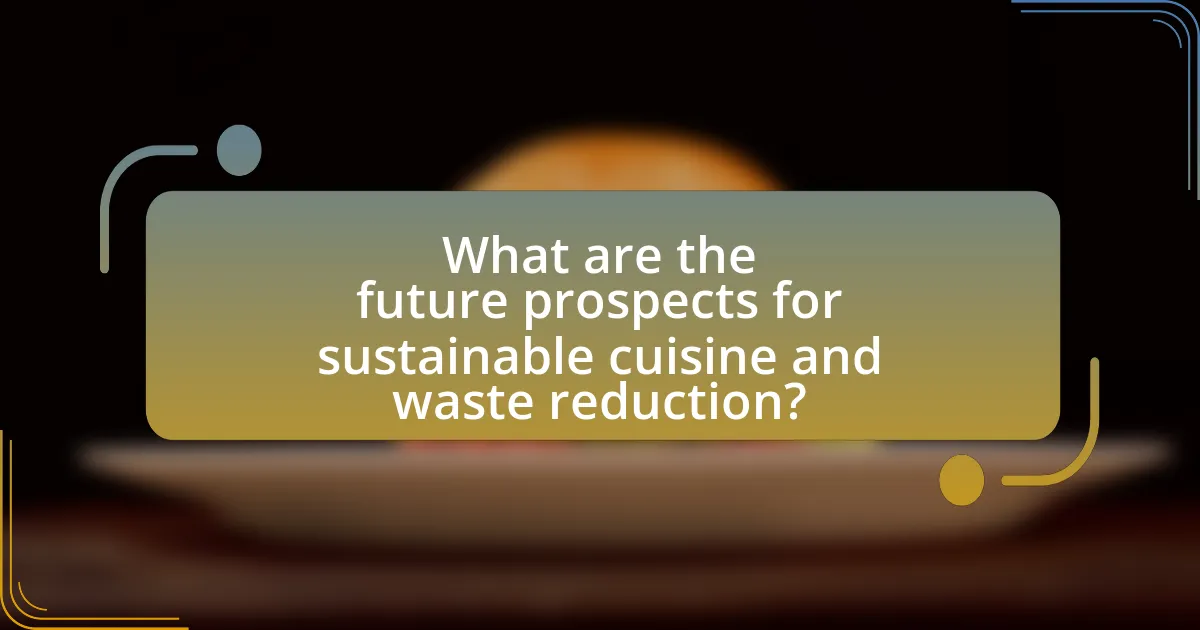
What are the future prospects for sustainable cuisine and waste reduction?
The future prospects for sustainable cuisine and waste reduction are promising, driven by increasing consumer awareness and technological advancements. As more individuals prioritize environmental sustainability, the demand for plant-based diets and locally sourced ingredients is expected to rise, reducing carbon footprints associated with food production and transportation. Additionally, innovations such as vertical farming and lab-grown meat are emerging, which can significantly minimize waste and resource consumption. According to a report by the Food and Agriculture Organization, approximately one-third of food produced globally is wasted, highlighting the urgent need for effective waste reduction strategies. Implementing practices like composting, food sharing apps, and upcycling food waste into new products will further enhance sustainability in the culinary sector.
How will policy changes impact sustainable cuisine practices?
Policy changes will significantly enhance sustainable cuisine practices by promoting regulations that encourage environmentally friendly sourcing and waste reduction. For instance, government incentives for local farmers can lead to increased availability of organic produce, thereby reducing transportation emissions and supporting local economies. Additionally, policies mandating food waste reduction in restaurants, such as the implementation of composting programs, can decrease landfill contributions by up to 30%, as evidenced by studies from the Food Waste Reduction Alliance. These changes create a framework that not only supports sustainable practices but also fosters a culture of responsibility among consumers and businesses alike.
What regulations are being proposed to support waste reduction?
Proposed regulations to support waste reduction include mandatory food waste audits for businesses, restrictions on single-use plastics, and incentives for composting and recycling programs. These regulations aim to minimize waste generation and promote sustainable practices within the food industry. For instance, the European Union’s Circular Economy Action Plan emphasizes reducing food waste by 50% by 2030, which aligns with similar initiatives in various countries to establish legally binding targets for waste reduction.
How can governments incentivize sustainable practices in the food industry?
Governments can incentivize sustainable practices in the food industry by implementing financial subsidies and tax breaks for businesses that adopt eco-friendly methods. For instance, the European Union has allocated over €1 billion to support sustainable agriculture initiatives, encouraging farmers to use organic practices and reduce chemical inputs. Additionally, governments can establish regulations that promote waste reduction, such as mandating food waste audits for large food businesses, which can lead to more efficient resource use and lower disposal costs. These measures not only foster a more sustainable food system but also contribute to economic growth by creating green jobs and enhancing food security.
What role do consumers play in shaping the future of sustainable cuisine?
Consumers play a crucial role in shaping the future of sustainable cuisine by driving demand for environmentally friendly food options. Their purchasing choices influence food producers and retailers to adopt sustainable practices, such as reducing waste and sourcing ingredients responsibly. For instance, a 2021 survey by the Food Marketing Institute found that 70% of consumers are willing to pay more for sustainable products, indicating a strong market preference for eco-friendly options. This consumer behavior encourages businesses to innovate and implement waste reduction strategies, ultimately leading to a more sustainable food system.
How can individuals contribute to waste reduction in their own kitchens?
Individuals can contribute to waste reduction in their own kitchens by implementing practices such as meal planning, composting, and utilizing leftovers. Meal planning helps in purchasing only necessary ingredients, which reduces food waste; studies show that meal planning can decrease food waste by up to 50%. Composting organic waste transforms it into nutrient-rich soil, diverting waste from landfills and reducing methane emissions. Additionally, creatively using leftovers can minimize waste; research indicates that up to 40% of food waste comes from uneaten leftovers. By adopting these strategies, individuals can significantly lower their kitchen waste and promote sustainability.
What are some examples of consumer-led initiatives in sustainable cuisine?
Examples of consumer-led initiatives in sustainable cuisine include community-supported agriculture (CSA) programs, which connect consumers directly with local farmers, promoting the purchase of seasonal produce and reducing food miles. Another initiative is the rise of food cooperatives, where members collectively own and operate grocery stores that prioritize organic and sustainably sourced products. Additionally, the “zero waste” movement encourages consumers to minimize food waste through practices like meal planning and composting, supported by apps that help track food inventory and suggest recipes based on available ingredients. These initiatives collectively contribute to a more sustainable food system by fostering local economies and reducing environmental impact.
What practical tips can be implemented for waste reduction in sustainable cuisine?
Practical tips for waste reduction in sustainable cuisine include implementing portion control, utilizing food scraps, and composting organic waste. Portion control minimizes excess food preparation, reducing leftovers that often go to waste; studies show that restaurants can decrease food waste by up to 30% through proper portion management. Utilizing food scraps, such as vegetable peels and stems, can create stocks or garnishes, thereby maximizing ingredient use and minimizing waste. Composting organic waste diverts food scraps from landfills, where they contribute to methane emissions, and instead transforms them into nutrient-rich soil, promoting a circular economy in food production. These strategies collectively contribute to a more sustainable culinary practice.
How can meal planning reduce food waste at home?
Meal planning can significantly reduce food waste at home by allowing individuals to purchase only the ingredients needed for specific meals, thereby minimizing excess. This approach helps in accurately estimating portion sizes and prevents the impulse buying of items that may not be used, which statistics show accounts for a substantial portion of household food waste. According to the Food and Agriculture Organization, approximately one-third of food produced for human consumption is wasted, and meal planning directly addresses this issue by promoting mindful consumption and efficient use of resources.
What are effective methods for utilizing leftovers creatively?
Effective methods for utilizing leftovers creatively include transforming them into new dishes, repurposing them in different cuisines, and incorporating them into meal prep. For instance, leftover roasted vegetables can be blended into soups or used in frittatas, while stale bread can be turned into croutons or bread pudding. Research indicates that approximately 30-40% of the food supply in the United States is wasted, highlighting the importance of innovative approaches to reduce waste and promote sustainability in cuisine. By creatively using leftovers, individuals can minimize food waste and contribute to a more sustainable food system.
